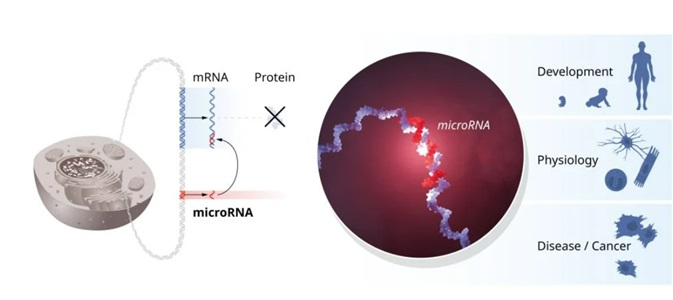News | Current Medical Affairs
Nobel Prize for Medicine 2024, awarded to pioneering discovery of microRNA which unveils new dimension of gene regulation
Time to read: 01:56 mins
Time to listen: 03:43 mins
Published on MedED: 7 October 2024
Type of article: News
MedED Catalogue Reference: MNG0050
Category: News
Category Cross-reference: Genetics
Keywords: microRNA, Nobel Peace Prize, Gene retulations
Top
Type of article: News
MedED Catalogue Reference: MNG0050
Category: News
Category Cross-reference: Genetics
Keywords: microRNA, Nobel Peace Prize, Gene retulations
Top

Image credit:The seminal discovery of microRNAs was unexpected and revealed a new dimension of gene regulation. © The Nobel Committee for Physiology or Medicine. Ill. Mattias Karlén
7 October 2024, 14:00
Victor Ambros and Gary Ruvkun have been awarded the 2024 Nobel Prize in Medicine for their pioneering discovery of microRNA, a class of tiny RNA molecules crucial for gene regulation in multicellular organisms.
Their groundbreaking research explained a fundamental biological principle: how cells with identical genetic material develop into specialized types, such as muscle and nerve cells, by selectively activating specific genes. This discovery of microRNA revealed an entirely new dimension to gene regulation, impacting how cells function and adapt.
Ambros and Ruvkun began their research in the late 1980s while studying C. elegans, a 1 mm-long roundworm. They focused on two mutant strains, lin-4 and lin-14, which showed defects in the timing of gene activation during development. Their investigation led to the discovery that lin-4 produced a small RNA molecule that didn’t encode for a protein, but instead inhibited the production of the lin-14 protein by binding to its mRNA. This new regulatory mechanism, published in 1993, initially received little attention as it was thought to apply only to worms. However, in 2000, Ruvkun's research revealed that microRNA regulation is conserved across the animal kingdom, sparking widespread interest and establishing the universality of this regulatory system.
MicroRNA plays a vital role in controlling the flow of genetic information from DNA to messenger RNA (mRNA) and, ultimately, protein synthesis. These tiny RNA molecules ensure that only the relevant genes are activated in each specific cell type, enabling cells to perform specialized functions. In humans, over 1,000 microRNAs have been identified, and they are known to regulate entire networks of genes, fine-tuning cellular processes and responding to environmental changes. Abnormal regulation by microRNAs can lead to serious diseases such as cancer, diabetes, and autoimmune disorders. Mutations in genes coding for microRNAs have also been linked to conditions like congenital hearing loss and rare syndromes associated with cancer.
Ambros and Ruvkun's work not only revealed a new layer of gene regulation but also helped explain how organisms develop and function, as well as how errors in this process can lead to disease. Their discovery has had profound implications for biological research and medicine, as microRNAs continue to be a critical area of study for understanding cell function, development, and disease prevention. Their contributions have opened new avenues for therapeutic interventions and deepened our understanding of the evolution of complex life forms.
Access the original press release
Press release. NobelPrize.org. Nobel Prize Outreach AB 2024. Mon. 7 Oct 2024.
Read more on this discover
Scientific background: For the discovery of microRNA and its role in post-transcriptional gene regulation
Disclaimer
This article is compiled from various resources researched and compiled by the contributor. It is in no way presented as an original work. Every effort has been made to correctly attribute quotes and content. Where possible all information has been independently verified. The Medical Education Network bears no responsibility for any inaccuracies which may occur from the use of third-party sources. If you have any queries regarding this article contact us
Fact-checking Policy
The Medical Education Network makes every effort to review and fact-check the articles used as source material in our summaries and original material. We have strict guidelines in relation to the publications we use as our source data, favouring peer-reviewed research wherever possible. Every effort is made to ensure that the information contained here is an accurate reflection of the original material. Should you find inaccuracies, out of date content or have any additional issues with our articles, please make use of the contact us form to notify us.


